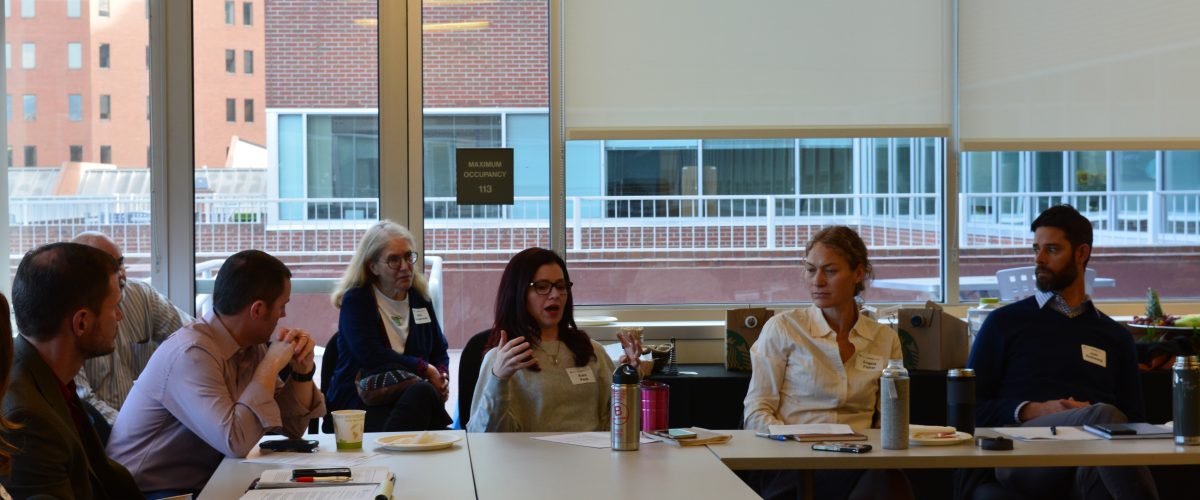
The atmosphere seemed more like old friends catching up than business leaders gathering at the Managing for Sustainability Advisory Council meeting last Wednesday. The Managing for Sustainability Advisory Council consists of 42 sustainability leaders in and around Denver alongside Business School faculty.
The advisory council keeps the CU Denver Business School in touch with the people spearheading sustainability best practices here in Denver. Top leaders in business, government, and non-profit sectors assist the Business School on the direction and content of the Managing for Sustainability program. They help the curriculum stay aligned with what students need to know regarding all things sustainable.
The advisory council includes representatives from businesses like B Lab Colorado, the City of Denver, CBRE, DaVita, Prologis, AT&T, and Xcel Energy.
The inside scoop on an advisory council meeting
You may be wondering what a typical advisory council meeting looks like. The morning begins with breakfast and networking followed by an introduction of all members. Wednesday’s meeting included updates on two current Managing for Sustainability courses: the Become a Sustainable Business Change Agent and B Lab: Business as a Force for Good.

Lecturer and program alumna Oxana Trotsenko described her B Lab course this semester and the changes she made. The council followed up by asking questions and giving her feedback and ideas on how to improve the course this next semester.
With great enthusiasm Ken Bettenhausen, PhD, professor of Management, and John Byrd, PhD, senior instructor of Finance and Managing for Sustainability, discussed the recent launch of the Massive Open Online Course (MOOC) program. They thanked various council members for contributing to the online course and gave an update on the success of the program.
“Sustainability is not a left or right decision but a good business decision.” – Christie Zimmerman
To reinforce the community aspect of the council, each week there’s a “Get to Know a Fellow Advisory Council Member.” This week Christie Zimmerman, the Product Standards Manager at Natural Grocers shared the lengths Natural Grocers takes to shelve organic, cage-free, and grass-fed food. Zimmerman stated, “Sustainability is not a left or right decision but a good business decision.”
The benefits of the advisory council
“Key players in sustainability in Denver are in this group.” – Jerry Tinianow
While the members are drawn from various industries, they share one common interest: a deeply held desire to change the world for the better.
- Nancy Ning, earning her PhD in Computer Science & Information Systems, is a new member and very interested in sustainability. Ning previously worked for ICLEI, which helps local governments become more sustainable. She’s interested in applying information technology to sustainability management to help solve problems.
- Angela Fisher, Co-Founder and Director of Aspire Sustainability in Breckenridge, is in her second year on the council. The council has been beneficial to her in terms of networking. She also enjoys providing her expertise to better inform graduate courses.
- Jerry Tinianow, Chief Sustainability Officer for the City of Denver, has been on the council for four years and describes the council as a great place to find networking contacts. “Key players in sustainability in Denver are in this group,” Tinianow shared. The City of Denver relies on academic work so it’s beneficial for Tinianow to be a part of these academic decisions.
- Jennifer Leitsch, Director of Corporate Responsibility at CBRE, is also council chairman and a CU Denver alumna. Leitsch earned her Professional MBA and MS in Marketing from CU Denver and has heavily supported the faculty in developing course curriculum. She wants to help contribute to the next generation’s education by bringing in her sustainability expertise. Leitsch shared the importance of integrating sustainability into any field regardless if the students pursue sustainability or not.
- Elizabeth Cooperman, PhD, professor of Finance and Entrepreneurship, has been on the council from the get-go. Sponsoring the undergraduate Net Impact program, Cooperman finds many guest speakers from the council. She knows the council is valuable to enforce the interaction with the business community, faculty, and students. “This has been the sweetest council, and they are all trying to change the world for the better. It’s like a breath of fresh air,” Cooperman shared.
From humble beginnings to a prosperous program
The Managing for Sustainability program is celebrating its tenth anniversary this May, and the program and council have significantly grown during these 10 years. Bettenhausen noted that even though titles have changed, many of the same members have remained on the advisory council.

From Byrd offering the first sustainability course in 2006 to Blair Gifford, PhD, professor of Management and Health Administration, implementing a sustainability course the following year, the sustainability program has certainly evolved. Gifford called together the first unofficial advisory council, which was a group of professionals who focused on sustainability. It included about a dozen people from companies like White Wave Dairy, Newmont Mining, and Price Waterhouse Coopers. They reviewed and provided input on what should be covered for Gifford’s courses.
Upon contacting the rest of the Business School faculty, Bettenhausen was surprised to find that faculty from every discipline was interested in teaching sustainability courses. The program largely surpassed everyone’s expectations with 123 students enrolling in the first semester and doubled in enrollment over a two-year span.
The program continues to grow, and we can’t wait to see what the next 10 years of the sustainability program will look like with the help of the Managing for Sustainability Advisory Council.


